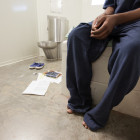
In late September, Torri was driving down the highway with her 11-year-old son Junior in the back seat when her phone started ringing.
It was the Hamilton County Sheriff’s deputy who worked at Junior’s middle school in Chattanooga, Tennessee. Deputy Arthur Richardson asked Torri where she was. She told him she was on the way to a family birthday dinner at LongHorn Steakhouse.
“He said, ‘Is Junior with you?’” Torri recalled.
Earlier that day, Junior had been accused by other students of making a threat against the school. When Torri had come to pick him up, she’d spoken with Richardson and with administrators, who’d told her he was allowed to return to class the next day. The principal had said she would carry out an investigation then. ProPublica and WPLN are using a nickname for Junior and not including Torri’s last name at the family’s request, to prevent him from being identifiable.
When Richardson called her in the car, Torri immediately felt uneasy. He didn’t say much before hanging up, and she thought about turning around to go home. But she kept driving. When they walked into the restaurant, Torri watched as Junior happily greeted his family.
Soon her phone rang again. It was the deputy. He said he was outside in the strip mall’s parking lot and needed to talk to Junior. Torri called Junior’s stepdad, Kevin Boyer, for extra support, putting him on speaker as she went outside to talk to Richardson. She left Junior with the family, wanting to protect her son for as long as she could ...

TUCSON, Arizona — Adriana Grijalva was getting ready to head to class at the University of Arizona in the fall of 2022 when she got a text message from her cousin telling her to stay put. The cousin, who works in maintenance at the university, had watched law enforcement descend on campus and reached out to make sure she was safe. A former student had just shot a professor 11 times, killing him.

Equal Justice USA (EJUSA) announced October 8 that it will partner with four new communities to build new restorative youth justice diversion programs. Restorative justice includes an accountability process that identifies root causes of youth criminal actions, while providing an opportunity for healing both for the person harmed and the person who has caused harm.

Louisiana is the only state to pass and then reverse Raise the Age legislation. Louisiana’s criminal justice system now treats all 17-year-olds as adults. Is reversing Raise the Age making a difference in the number of violent crimes by 18-year-olds?
More Headlines

Medical-legal partnerships work to address the problems that could be harming a student’s health. After ruling out stressors in Antonio’s family environment, a Yale legal team learned more about the challenges he was facing at school, including severe learning difficulties in the classroom and bullies outside of school. The clinicians realized they needed another team member to help: a lawyer. Can this approach work in other communities?

In 1998, the U.S. Supreme Court banned from courtroom evidence most results from lie-detector tests because those polygraph exams are scientifically flawed and unreliable, a ruling the American Psychological Association concurred with. However, in juvenile courts, where judges still have the discretion to allow or ban such so-called evidence, polygraphs have been used to coerce some juvenile sex offenders into making what researchers concluded were false confessions. The misuse doesn’t end there.

Children in Rutherford County, have been arrested and jailed at rates unparalleled in the state. This story reports on an investigation of why that is happening — and other ways the justice system there singles out children. A bill that would strengthen oversight of Tennessee’s juvenile detention centers has failed, despite a concerted push for reform after multiple county-run facilities were found to be locking children alone in cells.

When Heather Martin was a senior in high school, she survived the 1999 Columbine High School shooting that killed 12 students and one teacher in Littleton, Colorado. Even as she tried to move on with her life, she carried the trauma of that day inside her — often in ways that surprised her. In junior college she struggled with panic attacks and an eating disorder. Eventually, Martin dropped out of college. Today, Martin is a high school English teacher who prioritizes making her students feel safe and giving them the tools to understand and cope with trauma. She’s also the executive director of The Rebels Project, a nonprofit that supports survivors of mass tragedy.

The Los Angeles school district’s decade-old ban on suspensions for ‘willful defiance’ has benefited students — but also required a major investment in less punitive discipline methods. The district’s results have been positive: Data suggests that schools didn’t become less safe, more chaotic or less effective, as critics had warned.

In separate trials earlier this year, Jennifer and James Crumbley became the first parents in U.S. history to be convicted of involuntary manslaughter for a mass shooting committed by their child. They were each sentenced to 10–15 years in prison, the maximum penalty for the crime. Prosecutors argued the Crumbleys ignored urgent warning signs that their son Ethan was having violent thoughts, and that the parents provided access to the gun he used to kill four classmates and injure seven other people at his school in November 2021.

When Yusef Qualls-El was 17, a judge sentenced him to life behind bars. It was the mid-1990s, an era when the U.S. prison population exploded. Thousands of minors like Qualls-El received sentences of life without parole and entered prison at an age when their peers were going to college or starting their careers. But inside, education is often reserved for those who will soon return to society. As a result, those who were seen as the least likely to get out had the fewest opportunities.

Amid outbursts from gun control advocates in the spectator gallery, Tennessee’s GOP-dominated Senate passed a bill Tuesday to allow some teachers and staff to carry concealed handguns in public schools. The vote was 26-5 vote along partisan lines. Lt. Gov. McNally ordered the gallery cleared after issuing several warnings to protestors before the vote, but many refused to leave, despite the urging of state troopers and warnings that they could be arrested.











